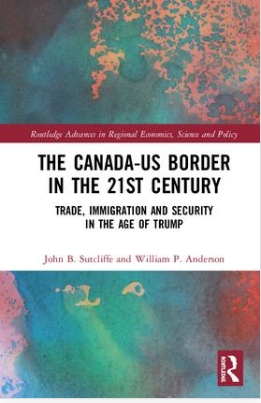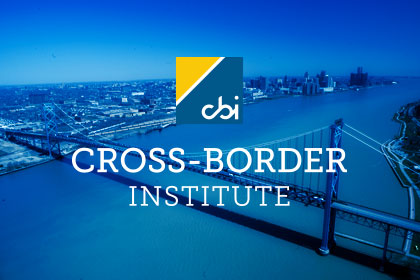The University of Windsor is located at the foot of the Ambassador Bridge, which connects Windsor, Ontario to Detroit, Michigan and represents one of the busiest trade corridors in the world. Due to its location, the Department of Political Science at the University of Windsor focuses on border issues. Although borders can be geographical, they can also be economic, social, cultural, and virtual. Our faculty members’ research addresses all these dimensions. Cross-border transportation, international trade, regional integration, territorial disputes, and border security are just some of the issues that fall under our areas of expertise. Using empirical and normative approaches, we analyse if borders are real or imagined, expanding or receding, and impactful or not. Please find information below on current projects that our faculty members are pursuing.
On This Page:
The Canada-US Border in the 21st Century: Trade, Immigration and Security in the Age of Trump
The Canada-US Border in the 21st Century: Trade, Immigration and Security in the Age of Trump

Borders are critical to the development and survival of modern states, offer security against external threats, and mark public policy and identity difference. At the same time, borders, and borderlands, are places where people, ideas, and economic goods meet and intermingle. As Dr. John B. Sutcliffe and Dr. William P. Anderson explain in their new book, the United States-Canada border demonstrates all of the characteristics of modern borders, and epitomises the debates that surround them. Canada-US Border in the 21st Century: Trade, Immigration and Security in the Age of Trump caters to scholars of North American integration and border studies, and to policy practitioners, who will be particularly interested in the case studies and what they say about the impact of border reform. It examines the development of the US-Canada border, provides a detailed analysis of its current operation, and concludes with an evaluation of the border’s future. The central objective is to examine how the border functions in practice, presenting a series of case studies on its operation.
The Cross-Border Institute

The Cross-Border Institute at the University of Windsor was founded in 2008 under the direction of Dr. Bill Anderson, Ontario Research Chair in Cross-Border Transportation Policy. It is dedicated to research, education and public outreach related to the movement of people, goods and services across the Canada-US border. It takes a multi-disciplinary perspective, incorporating engineering, economics, the social sciences, management and law.
CBI’s location steps away from the Windsor- Detroit border – the largest point of crossing for the huge Canada-US trade relationship – provides a unique perspective from which to study the impact of trends in cross-border transportation, trade, technology, and policy decisions by governments on both sides of the border.
Working with public and private sector stakeholders, CBI has developed expertise in cross-border business and border management, both critical to Canada’s economic future. It is a leading centre for research on cross-border supply chains and transportation.
Jerusalem Old City Initiative

Since 2003 the department has been home to the ‘Jerusalem Old City Initiative’. The main aim of the Initiative is to develop creative options for governance and management of the Jerusalem Old City that could be used in preparation for a negotiated settlement between Israelis and Palestinians. The website for the Jerusalem Old City Initiative can be found at www.uwindsor.ca/jerusalem-old-city-initiative. The Initiative has a partnership with NGOs and a number of leading academics and international civil society specialists.
Currently entering its fifth year, the Initiative has brought together Israelis, Palestinians, and others to work on key issues, host workshops, and produce reports on a range of subjects that will hopefully provide a blueprint for peace. The Initiative has been supported by over $1 million in research funding from the Department of Foreign Affairs and International Trade (DFAIT) and Canadian International Development Agency (CIDA). The Initiative has already employed several students in research positions both during and after their degree. It also has research position(s) available for MA students.

